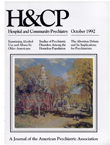Clinical Review Panels Versus Court Hearings in Treatment Refusal by Involuntary Patients
Abstract
Suspension of Maryland's clinical review panels lasted more than a year. The Maryland court listed what additional protections needed to be written into the law, and new legislation on panels was passed during the next legislative session and went into effect on July 1, 1991. The new law restores the use of the review panels for patients who refuse drug treatment. It provides more procedural protections for patients, and it also includes requirements for possible judicial appeals for patients if the panel decides on medication.
The new law includes language from a U. S. Supreme Court ruling in February 1990 in the case of Washington V. Harper, in which the court decided that the patient's interests were adequately protected by "allowing the decision to medicate to be made by medical professionals rather than a judge . . . under fair procedural mechanisms" (1). As Ford (7) has noted, "Due process does not have to mean judicial process."
Before the panels were suspended, our state hospital had used them only as a last resort, consistent with the American Psychiatric Association's guidelines on the importance of working "to maximize the patient's participation in the treatment dccision-making process . . . to try to understand the basis for objections and take them into account in for-mulating a treatment plan" (8). At the time of the suspension of the clinical review panels, the cases of only three of 55 current adult inpatients (about 5 percent) at our hospital had been referred to a panel.
The new Maryland law on clinical review panels requires a review and a report back to the legislature in two years. In the meantime, I support the return of the panels with the procedural protections that have been added. Physicians, not lawyers and judges, should make medical dccisions. As Appelbaum and Gutheil(9) noted, "Legal conceptions of a right to refuse treatment may not accurately portray the realities of the clinical situation, in which patients' refusal is determined by the dynamics of their illness rather than reflecting a pnincipled exercise of their legal rights." Mander and associates (10) reported that at two-week follow-up, patients who had refused medications were less likely to refuse, more likely to view medications as important, and less likely to believe in alternative treatments; they also showed clinical improvements.
At this time Mr. A is doing well and says he feels "the best I even have." He has been out of the hospital for months, lives in supervised housing, and attends day treatment. He has returned part time to college to complete his degree.
Access content
To read the fulltext, please use one of the options below to sign in or purchase access.- Personal login
- Institutional Login
- Sign in via OpenAthens
- Register for access
-
Please login/register if you wish to pair your device and check access availability.
Not a subscriber?
PsychiatryOnline subscription options offer access to the DSM-5 library, books, journals, CME, and patient resources. This all-in-one virtual library provides psychiatrists and mental health professionals with key resources for diagnosis, treatment, research, and professional development.
Need more help? PsychiatryOnline Customer Service may be reached by emailing [email protected] or by calling 800-368-5777 (in the U.S.) or 703-907-7322 (outside the U.S.).



